Artificial Intelligence (AI) has gradually impacted our daily lives, leading to noticeable and subtle changes. AI technology provides solutions like self-driving vehicles and virtual assistants like Alexa or Siri. We can see the emergence of this technology all around us. Although this technology brings many benefits, it poses various ethical questions about privacy concerns and fairness when making decisions. We must understand the implications of all new advancements before moving forward for everyone to benefit from the benefits they may bring safely.
In this blog post, we’ll dive deep into unique real-life examples of AI: Ethics, Privacy Issues & Real-life Examples! 🛡️ , discussing potential scenarios with corresponding issues at hand – so come ready with an open mind while exploring some profound concepts!
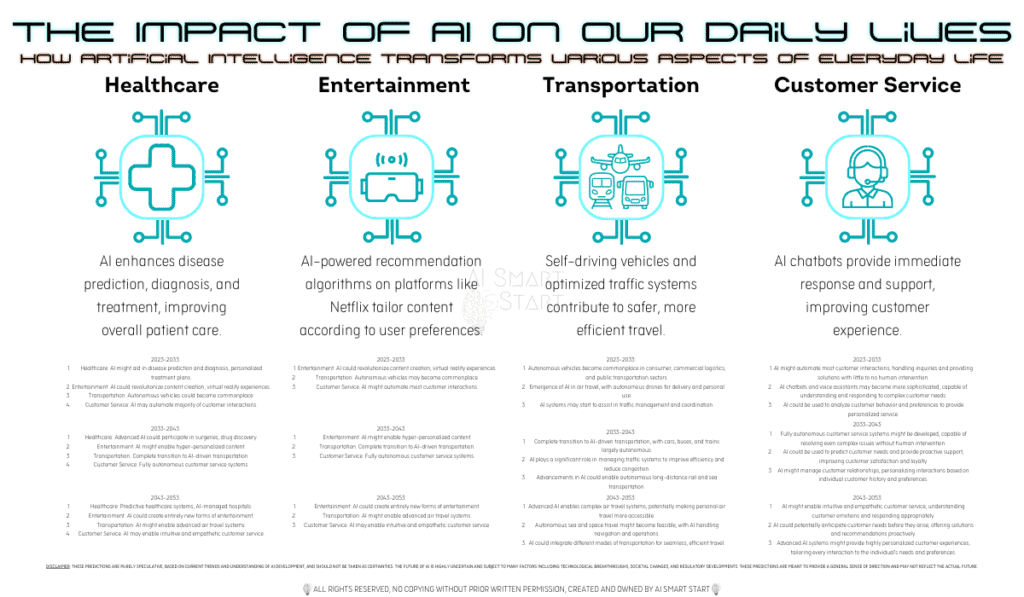
AI and it’s Impact on Our Daily Lives.Introducing the AI landscape: What is Artificial Intelligence (AI), and what are its implications for ethics and privacy?
The growing popularity of Artificial Intelligence (AI) in recent years is justified.
AI, or Artificial Intelligence, pertains to machines that can carry out tasks that usually demand human intelligence.
What exactly is it? While AI has the potential to revolutionize industries and improve our lives, it also poses ethical and privacy concerns. With the ability to collect, analyze, and use vast amounts of data, there is a risk that personal and sensitive information may be misused or exploited. As leaders in our respective fields, it’s crucial to have open and informed discussions about the responsible development and implementation of AI. By working together to address these concerns, we can harness the true potential of AI while upholding ethical and privacy standards and regulations.
AI Model Development Process: From Data Input to DeploymentUnderstanding Ethical Issues in AI – Types of ethical issues surrounding AI, real-life examples of ethical violations, and how to mitigate them.
The progress of technology has led to a rise in ethical concerns surrounding AI.
From privacy concerns to unintended consequences, the scope of possible ethical violations expands with each innovative development. While AI can help solve complex problems, real-life examples of unethical use include biased algorithms or autonomous weapons. As more industries integrate AI into their operations, it’s crucial to understand the ethical issues surrounding AI and how to mitigate them.
By promoting transparency, accountability, and responsible use, we can effectively utilize the benefits of AI for positive change while avoiding any potential risks. We are responsible for staying informed and prioritizing ethical considerations in AI development and deployment.
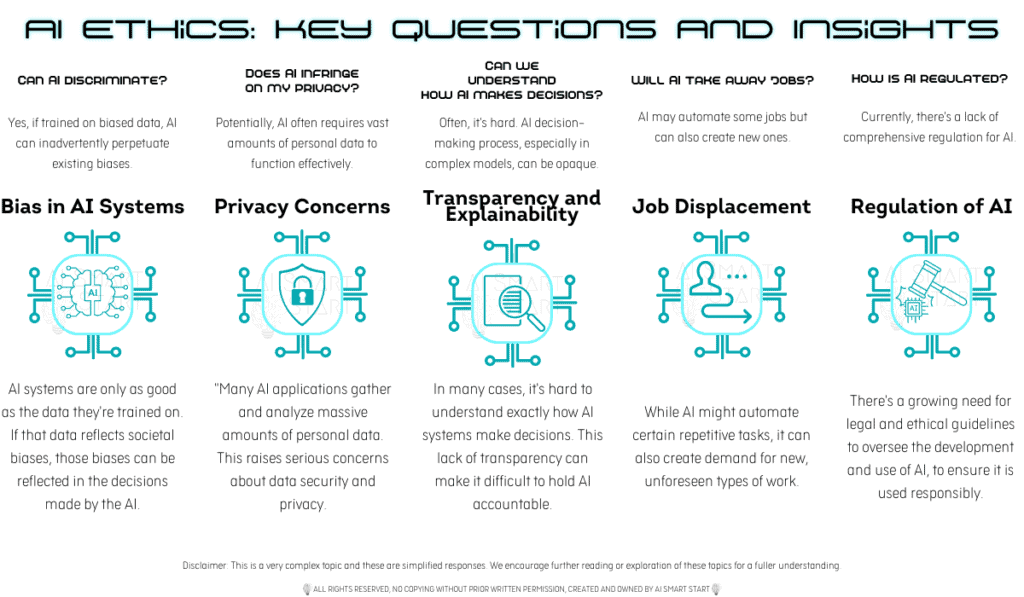
Exploring AI Ethics: An infographic navigating vital ethical dilemmas in Artificial Intelligence.Examining Privacy Issues in AI – Definition of personal data, types of privacy concerns related to AI, and real-world cases
As Artificial Intelligence continues to advance, it’s essential to understand the privacy concerns that come along with it. Personal data is any information we can use to identify an individual, such as name, address, or internet browsing history. With AI, personal data can be collected and used in ways that weren’t possible before. This leads to several privacy concerns, such as cyber-stalking, data breaches, and bias in decision-making processes. Real-world cases have demonstrated the importance of addressing these concerns. For example 2018, a Facebook data breach affected approximately 50 million users, leading to questions about how personal data is used and protected. We must prioritize privacy and meticulously address concerns when developing and executing AI technologies.
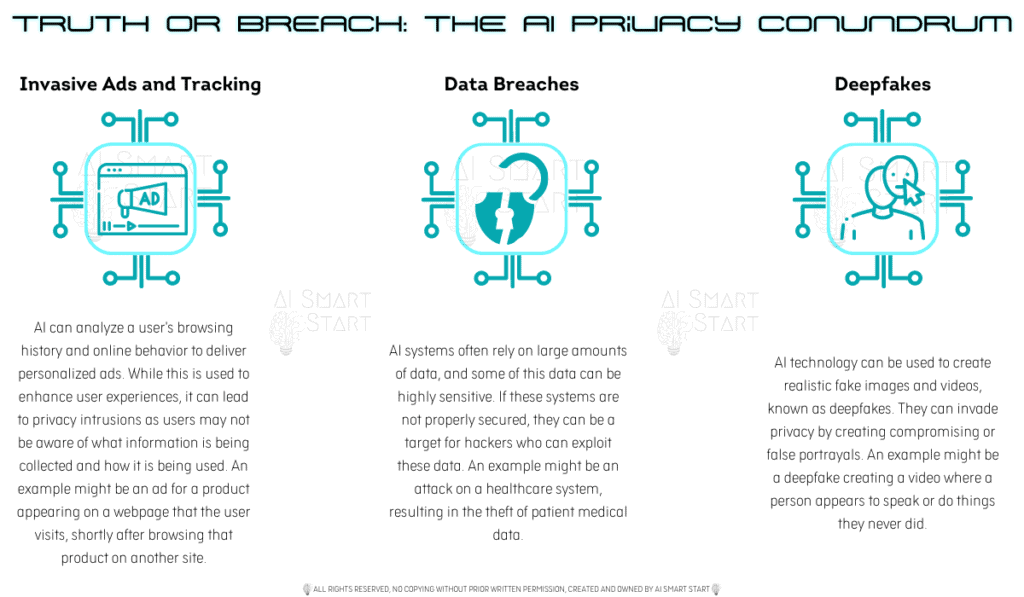
Infographic 'Truth or Dare: AI's Impact on Your Privacy' showing potential AI privacy threats.Implementing a Proactive Approach to AI Ethics & Privacy – Strategies for creating an ethical and privacy-focused environment with AI.
The rapid advancement of AI technology demands that businesses take a proactive stance in addressing the ethical and privacy concerns accompanying it. It is crucial to stay ahead of the curve and ensure that these concerns are addressed in a responsible and transparent manner.
It is essential to implement strategies that create an open and privacy-focused environment. By adopting transparency, accountability, and awareness-raising measures, companies can demonstrate their leadership in effectively managing the ethical and privacy risks and opportunities that AI presents. Ensuring that employees are knowledgeable about the potential impact of AI on privacy and ethics can also go a long way in establishing trust with consumers.
By implementing a proactive approach to AI ethics and privacy, businesses can promote a culture of responsibility, accountability, and professionalism that positively impacts employees, customers, and society.
Thoughts on AI Ethics & Privacy – Best practices for responsible use of AI technology, potential policy changes, and the future outlook of the field.
As we end our discussion on AI ethics and privacy, it’s important to highlight some best practices for the responsible use of AI technology.
The most important aspect of AI implementations is transparency.
It is crucial to have knowledge of the data that AI collects, its usage, and the decisions made based on it. Moreover, it is vital to implement policy changes that guarantee AI’s ethical and responsible use. This involves considering the impact on marginalized communities, protecting personal information, and ensuring that automated decisions don’t exacerbate existing biases.
Looking to the future, it’s clear that AI will only continue to grow in prominence.
However, it must be kept in check with ethical considerations and best practices to avoid potentially harmful outcomes. As a community, we must unite to hold ourselves accountable and strive to use AI technology to benefit society.
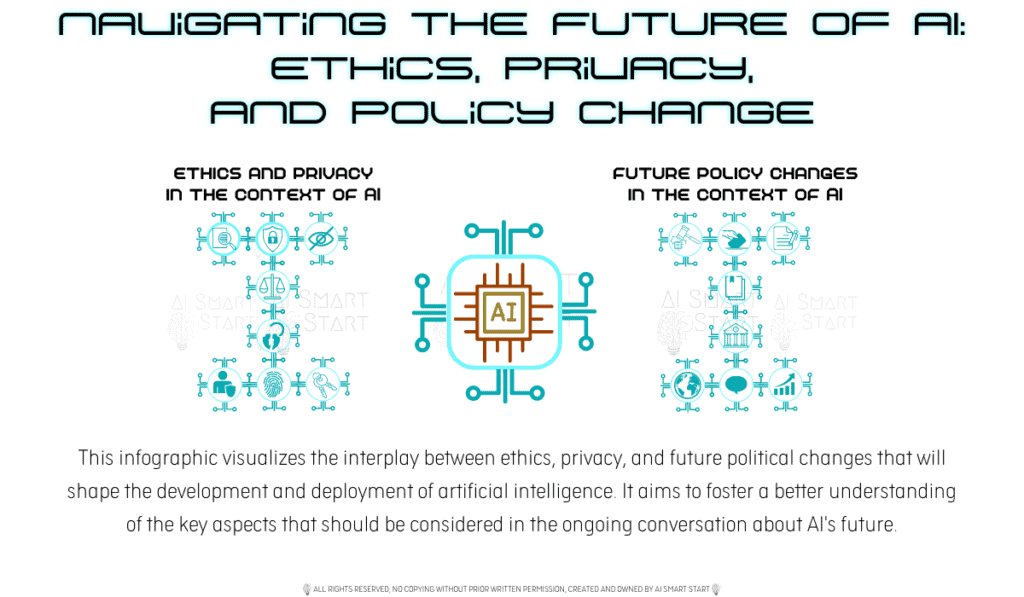
Exploring AI's Ethical, Privacy, and Future Policy Considerations – an intersection of significant aspects shaping AI's Future.It’s clear that Artificial Intelligence has immense potential, but the flip side of this is that it also brings with it many ethical and privacy challenges. Everyone involved in developing, deploying, and using AI must take these issues seriously — from businesses creating AI policies to developers designing privacy-friendly systems to government regulators crafting ethical norms.
Responsible development and implementation of AI are required for us to capitalize on its benefits fully. While there will no doubt be a few bumps along the way, thoughtful collaborations across all stakeholders can set us on a path toward responsible use of AI technologies– ultimately leading to a future of positive societal outcomes.
With so much potential riding on our shoulders, let’s do the right thing and ensure that Artificial Intelligence is developed ethically, respectfully, and legally compliant!
Artificial intelligence (AI) has been discussed in the news more and more these days, and rightfully so. As technological advances make it possible for AI to become increasingly savvy, it is becoming an integral part of our everyday lives.
AI technology is being employed everywhere, from voice assistants like Alexa, which can recognize our voices and respond to commands to facial recognition software used by law enforcement agencies worldwide.
However, with this growing use of AI comes tremendous responsibility for consumers and creators. Addressing ethical concerns related to privacy, the accuracy of data analysis, and race or gender-related biases in decision-making is of utmost importance.
Is AI a Threat To Privacy : AI Privacy Ethics AI Smart StartWe’ll attempt to unravel some of these complex ethical issues surrounding artificial intelligence while exploring exciting examples from the real world.
One of the most pressing ethical issues related to AI is privacy.
With the advancement of AI technology, there is an increase in the capacity to gather and scrutinize data about people. This raises questions about who has access to this data, how it is being used, and whether or not it is being used ethically.
Privacy concerns are rising as we delve deeper into the age of Artificial Intelligence (AI).
Data privacy is essential for maintaining user trust and compliance with increasingly strict regulatory standards.
Here, we’ve compiled some crucial steps businesses can take to secure user data and bolster privacy in their AI applications. Let’s explore:
- Data Minimization: Companies should collect only the data they need to provide services or products. The unnecessary collection of data increases the risk of privacy breaches.
- Privacy by Design: Privacy should be a core aspect of the product design process, not an afterthought. It involves integrating privacy at every stage of product development, ensuring the product complies with relevant privacy regulations.
- Transparency: Companies should be clear about what data they are collecting, why they are collecting it, and how they are using it. This should be communicated and understandably to the users.
- User Consent: Companies should seek explicit and informed consent before collecting data. Users should also be given the option to opt out of data collection.
- Data Encryption: Companies should use robust encryption methods to protect the data during storage and transmission.
- Regular Audits and Assessments: Regular audits and risk assessments have been carried out to identify any potential weaknesses in the system. This can help in proactive risk management.
- Data Breach Response Plan: Companies should have a robust response plan for data breaches. This includes notifying the affected users and relevant authorities on time.
- Employee Training: Employees should regularly be updated on the best data privacy and security practices.
- Third-Party Vetting: Companies should follow strong privacy practices when using third-party services.
- Privacy Policies: Privacy policies should be regularly updated to reflect changes in practices or regulations. They should be easy to access and understand for the users.
By following these steps, companies can significantly reduce the risk of privacy breaches and build trust with their users.
Another primary concern regarding AI is the accuracy of data analysis.
The results will be similarly skewed if the data fed into AI algorithms is biased, complete, and accurate. This can have profound implications, particularly in fields such as healthcare, where decisions made by AI systems can directly impact people’s lives.
As we delve deeper into the era of Artificial Intelligence, one aspect that surfaces time and again is the concern regarding the accuracy of data analysis. The efficacy and correctness of AI systems are primarily contingent on the quality of the data they’re trained on. If the data input is biased, incomplete, or simply inaccurate, the outputs produced by the AI system, no matter how advanced or sophisticated, are likely to mirror these flaws. This can bear significant consequences, particularly in sectors like healthcare, where the decisions made by AI have direct ramifications on people’s lives.
To bring this issue to light, let’s examine a few instances where erroneous data led AI systems astray, reinforcing the pivotal role that accurate and unbiased data plays in the functioning of AI.
Finally, there is the issue of race or gender-related biases in decision-making. If the AI algorithms are trained on data that reflect these biases, they will inevitably produce biased results. This issue is particularly problematic, as it can perpetuate societal inequalities and bigotry.

Healthcare Misdiagnoses: AI has incredible potential in healthcare, where it can aid in diagnosing diseases and predicting patient outcomes. However, if trained on inaccurate or biased data, these systems could lead to severe misdiagnoses. For example, an AI system introduced predominantly on data from male patients might not perform as well when diagnosing diseases in female patients.
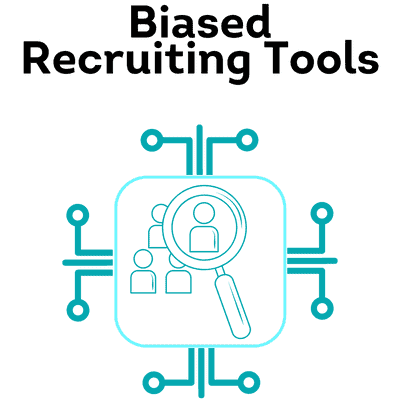
Biased Recruiting Tools: AI often streamlines the hiring process by scanning resumes and predicting a candidate’s success. However, if these algorithms are trained on personal data, they may perpetuate these biases. For instance, Amazon had to scrap its AI recruiting tool when it was found to favor male candidates, as it was trained on resumes submitted to the company over ten years, most of which came from men.
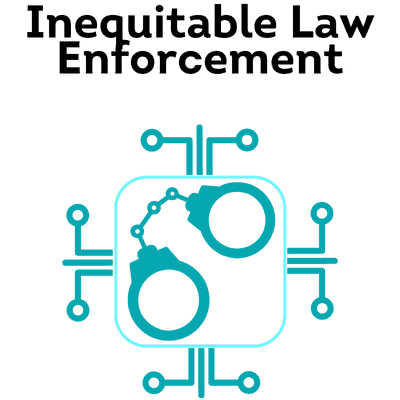
Inequitable Law Enforcement: AI systems are also used in predictive policing, where they analyze data to predict where crimes are likely to occur or who is expected to commit them. However, these systems can reinforce existing biases if trained on biased data. For example, if a police force has a history of disproportionately stopping and searching people from a particular racial or ethnic group, an AI system trained on this data might unfairly target people from that group.
As AI becomes increasingly ubiquitous, it is essential that these issues are addressed and that the technology is developed ethically and responsibly. As artificial intelligence continues to increase in our daily lives, we must remain vigilant and aware of the ethical implications that come with it.
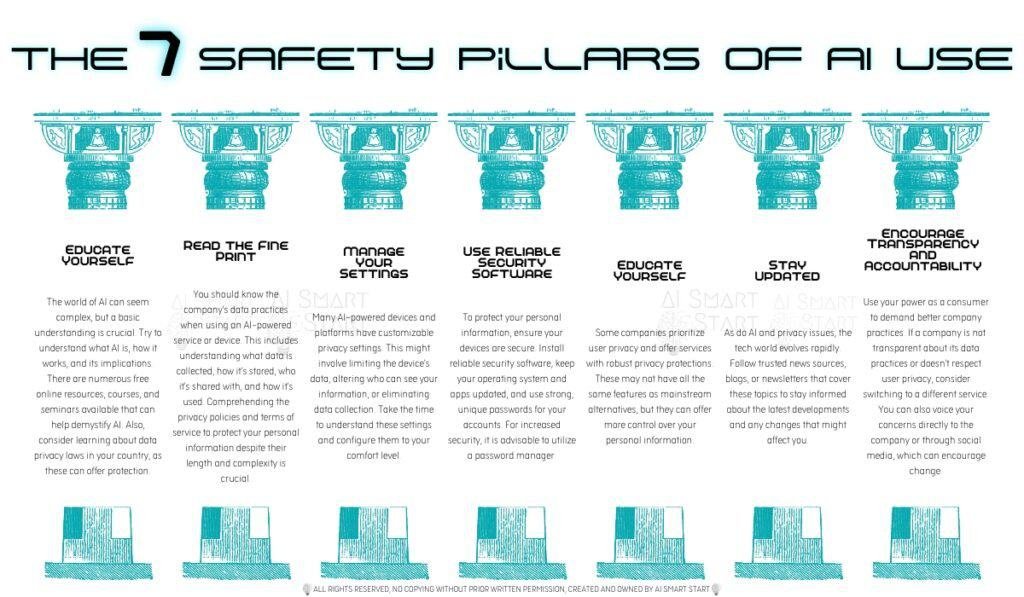
The Seven Safety Pillars of AI Use - Guidelines to navigate the complex world of AI and data privacy.While AI can revolutionize how we live and work, it is equally important that we recognize the potential for bias and unintended consequences that can arise from its use. By being mindful of these ethical considerations, we can ensure that AI is implemented responsibly and ethically that benefits all of society without perpetuating existing inequalities or causing harm to vulnerable populations.
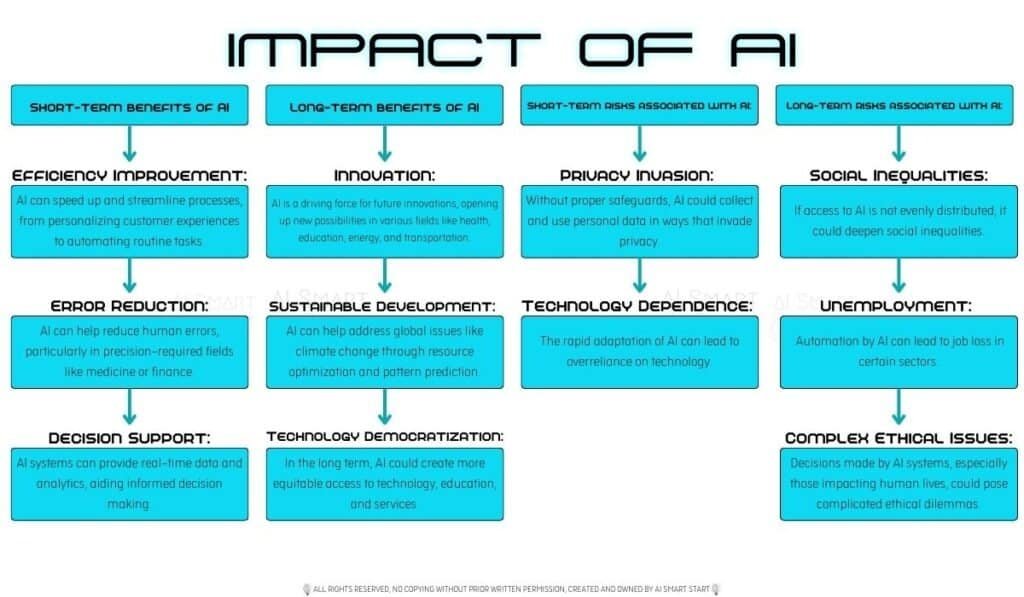
Weighing the Pros and Cons: A Comprehensive Look at AI's Short-term and Long-term Impacts.A well-informed and proactive approach to AI ethics is crucial to building a better future.
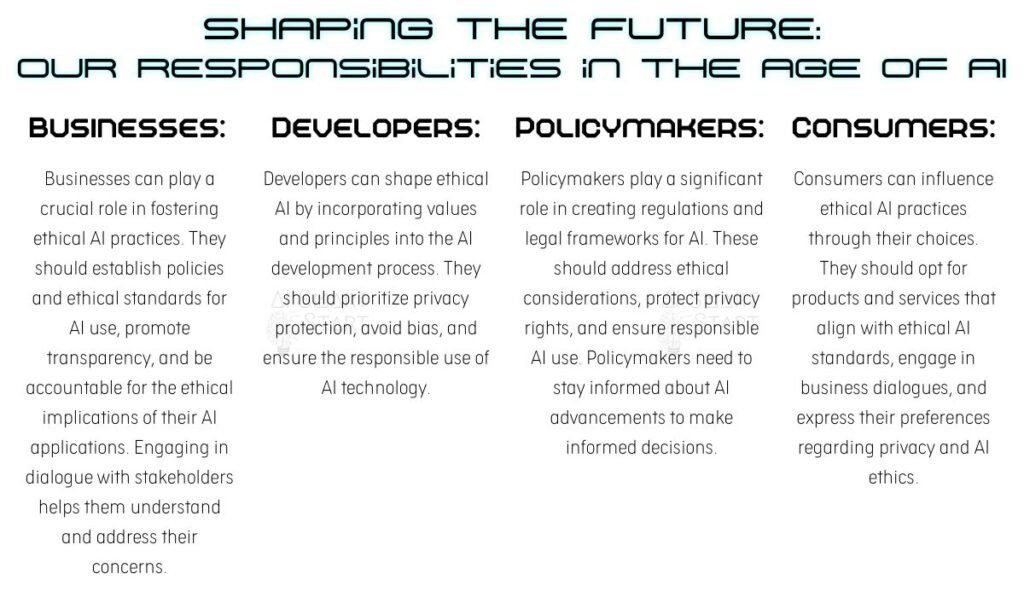
Shaping the Future: Our Shared Responsibilities in the Age of AI - A focus on businesses, developers, policymakers, and consumers.What is AI, and why is it so crucial today?
AI, short for Artificial Intelligence, is a field that’s rapidly advancing. It involves machines performing tasks that would typically require human-like intelligence. With its ability to learn from data and make informed decisions, AI has become a game-changer in our lives today. From improving healthcare to driving autonomous cars, AI has brought numerous advancements in various industries.
AI in Automotive:
- Self-driving cars with AI algorithms can navigate autonomously, reducing accidents and revolutionizing transportation.
- AI-based predictive maintenance systems monitor vehicle performance in real-time, optimizing efficiency and reducing maintenance costs.
- Intelligent traffic management systems leverage AI to improve traffic flow and reduce congestion, enhancing overall transportation efficiency.
AI in Finance:
- AI algorithms analyze financial data to detect fraudulent activities, protect against financial crimes, and enhance security.
- AI-powered chatbots provide personalized customer support and assist with financial inquiries, improving customer experiences.
- AI-driven investment strategies leverage data analysis and predictive analytics to optimize portfolio management and decision-making.
AI in Retail:
- AI-based recommendation systems analyze customer preferences and behaviors to provide personalized product recommendations, enhancing the shopping experience.
- AI-powered inventory management systems optimize supply chain operations, reducing costs and ensuring efficient stock management.
- AI-driven customer analytics enable targeted marketing campaigns, improving customer engagement and increasing sales.
AI in Manufacturing:
- AI-driven predictive maintenance systems monitor equipment performance and detect anomalies, minimizing downtime and improving productivity.
- AI-powered quality control systems inspect products in real-time, ensuring higher quality and reducing defects.
- Robotics and automation powered by AI algorithms streamline manufacturing processes, increasing efficiency and productivity.
For instance, it can detect fraud and predict equipment failure before it occurs, making production more efficient and reducing costs. It has also enhanced customer experiences by providing personalized recommendations and assistance.

Revolutionizing Production Lines: How AI Detects Defects and Enhances Efficiency.AI has transformed the status quo, paving the way for new opportunities and innovations in today’s world.
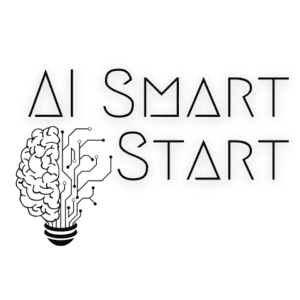

One thought on “AI: Ethics, Privacy Issues & Real-life Examples! 🛡️”